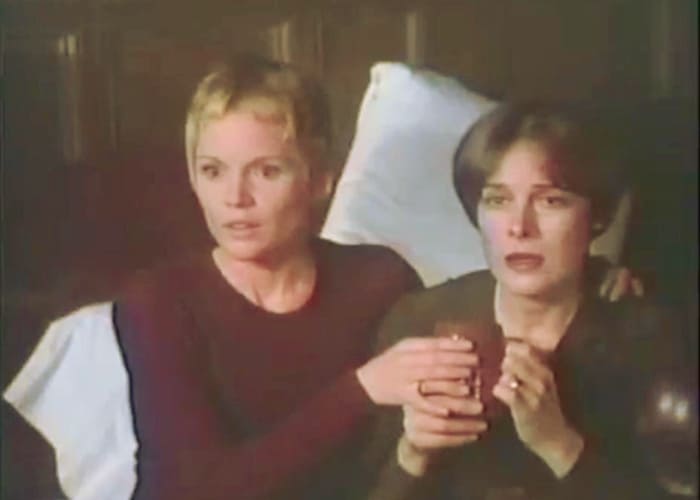Welcome to 4:3 & Forgotten — a column where Kieran Fisher and I get to look back at TV terrors that scared adults (and the kids they let watch) across the limited airwaves of the 70s. This week’s entry sees a cruel man dealt a deadly blow by the women in his life, and there’s not a damn one among you who would blame them. Once the deed is done, though, the body disappears, and the women begin to suspect they’re going mad, someone is screwing with them, or worse — that the dead man may have returned.
Now join me as we take a trip back to the 1970s with a TV adaptation of a classic French novel that previously hit far bigger screens as Diabolique and now arrives as… Reflections of Murder!
Where: ABC
When: November 24th, 1974
Michael (Sam Waterston) is headmaster at a small boys school on a slightly bigger island, and he hates everything about it. He hates the kids, he hates the school, he hates pianos, and he even hates his wife Claire (Joan Hackett) who inherited the place from her father. She suggests he should simply leave if he’s so unhappy, but he counters with a plan he’s been thinking over for months. They could sell the land to developers for $3 million, split the profit, and go their separate ways. Claire puts the kibosh on the idea for sentimental reasons, and Michael is left with no alternative but to cheat on her with a hot teacher named Vicky (Tuesday Weld) while ramping up the systematic abuse of his wife. Poor guy. He’s in for a surprise, though, when the two women plot and execute his murder, but soon they’re the ones left in shock when he appears to return from the dead. Ruh roh!
I know what you’re thinking — hey, that sounds an awful lot like that saucy 90s movie starring Sharon Stone and Isabelle Adjani — and you’re right, it does. Both films are based on Pierre Boileau‘s & Pierre Ayraud‘s novel Celle Qui N’Etait Plus which is better known for its most famous adaptation, Henri-Georges Clouzot’s Les Diaboliques (1955). This TV movie sticks closer to Clouzot’s film than the source novel, so don’t expect much in the way of surprises here, but it’s a solid telling of the tale all the same.
The sharp, twisty writing does much of the heavy lifting, and Carol Sobieski‘s (The Toy, 1982; Fried Green Tomatoes, 1991) script does good work balancing the darkness within the standards of 70s network television — we even get a suggestive tease as the two women lay beneath bed covers and look longingly into each other’s eyes. The more controversial element, at least in retrospect, occurs when one of the young boys asks Claire why she ever married this prick. “I was young,” she tells the boy, “and he was almost as beautiful as you are.” Eesh, not cool Claire, not cool.

Director John Badham is currently working back in television, but he followed up this TV movie with big success on bigger screens. His filmography includes hits like Saturday Night Fever (1977), Blue Thunder (1983), WarGames (1983), Short Circuit (1986), Stakeout (1987), Bird on a Wire (1990), Point of No Return (1993), and more that you’ve definitely seen and possibly loved. He helps keep this one moving visually with attractive direction, slow zooms, and plenty of tight close-ups on Claire’s anxious mug as her sanity grows more and more fragile.
Hackett’s portrayal of the nervous and harried wife leans obnoxious at times, but it’s the character who’s more to blame for that than the actor as her performance is actually quite good. Still, even if you don’t know the big reveal heading your way in the final act, it’s difficult not to be annoyed by her guilty behavior. Wake up Claire! Your hubby was a prick! Your hubby might still be a prick! He once threatened to sell you to Ethiopia where he claims they keep women in corrals! Waterston went on to build a career playing good, decent men, but he excels here at being a complete and utter asshole. It’s ideal as the performance leaves viewers wanting him dead and hoping the women get away with it, and both feelings add to the film’s growing thrills and tension while also adding a bigger hit once the final reveal lands.
Reflections of Murder can’t touch Clouzot’s film, but it’s legit better than you’re expecting from a 70s TV movie and possibly even better than most of the other adaptations. It’s a solid thriller despite its TV trappings, and while the film’s final moments leave a bit more ambiguity regarding the fate of the guilty party (parties? I’ll never tell) than Clouzot’s does it still works well to end on a mysterious yet satisfying note.
Turn the dial (okay fine just click here) for more 4:3 & Forgotten.
0 comments:
Post a Comment